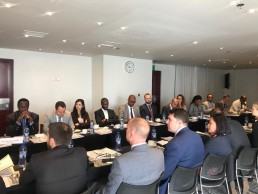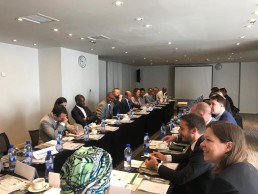Institutional and Working Methods Issues Affecting AUPSC and UNSC Relationship
The seminar brought together more than forty participants including current, outgoing and incoming members of the African Union Peace and Security Council (AUPSC) and United Nations Security Council (UNSC) as well as representatives of the African Union Commission (AUC) and Regional Economic Communities (RECs).
The central focus of the seminar was to shed light on the question of how differences between the AUPSC and the UNSC in terms of the institutional framework, working methods and decision-making dynamics affect the partnership.
Concept Note
Breakfast Seminar: Institutional and Working Methods Issues Affecting AUPSC and UNSC Relationship
Changes in the institutional terrain of Africa involving the establishment of the African Union Peace and Security Council (AUPSC) and the UN’s recognition that it cannot on its own address the challenges to peace and security in Africa have prompted the establishment and nurturing of partnership between the AUPSC and the UNSC. Underpinned by the PSC Protocol’s provision stipulating close working relationship with the UNSC and Chapter VIII of the UN Charter, the working relationship between the AUPSC and the UNSC has become an important avenue in mobilizing joint response for conflict and crisis situations in Africa.
While the PSC is the only international body with which members of the UNSC have institutionalized and regular engagement, the relationship between the AUPSC and the UNSC continues to face challenges. In recent years, much of the challenge to the relationship emanates from the internal power dynamics and deepening divisions in the UNSC in particular. Yet, apart from the perennial doctrinal issues of status and authority, other issues including internal institutional set up, working methods and capacity differences have come to affect the relationship. Thus, beyond the internal political dynamics that shape both councils’ decisions and ‘make it challenging to achieve consensus,1 there are questions on the institutional, procedural and working method differences that affect AUPSC-UNSC relationship about which policy makers should be aware of.
In an attempt to identify and understand the institutional, process and working methods issues that affect the AUPSC-UNSC relationship, Amani Africa has published a special research report: ‘The Internal Institutional Setup and Working Processes Shaping the Relationship Between the AUPSC and UNSC’.
Objectives
Using the special research report, the seminar aims at examining the current state of AUPSC-UNSC relationship and the factors and forces shaping the relationship. Hence within this broader framework the seminar seeks to interrogate the following aspects:
Trends in peace and security and recurrent issues that shape the operationalization of the mandate of the two Councils and their partnership
– Institutional set up, working methods and policies that inform the partnership and collaboration of the two institutions
– Mechanisms that could best improve and institutionalize the relationships between AU PSC and UNSC by moving beyond annual consultations and ensure continuous and systematic engagement
– Measures that could be taken by various actors (including by the secretariats of the Councils, members of the Councils) to enable AUPSC and UNSC in bolstering their collective decision-making capacity of the Councils
– Modalities that may strengthen timely and coordinated responses to crises and emerging threats through comparative advantage of the AU PSC and UNSC
1 A recent study observed that ‘the councils’ internal political dynamics, the uneven diplomatic capacities of member states, and broader debates over political primacy and subsidiarity …limit cooperation’. Daniel Forti and Priyal Singh, Toward a More Effective UN-AU Partnership on Conflict Prevention and Crisis Management’, IPI & ISS (October 2019) 4.




